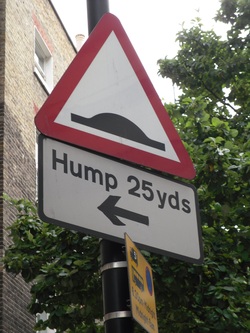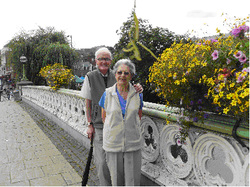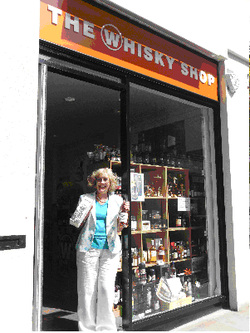Jane Shipman

Teaching has really changed in the thousand years I've enjoyed this career! When I began there were, maybe, three computers in my school, video editing actually meant splicing filmstrips, and a video camera was a two-part machine which had to be carried AND hung from a sholder strap and bounced off the hip as one walked...
I began in Norfolk, VA, in a junior high school and taught English as a Foreign Language at night to the brides and families brought home by soldiers returning from Vietnam. From there I wandered to Knoxville, TN, and a high school position during the era of 'phase electives' - short bursts of teaching about a variety of English subjects - grammar in one nine weeks, Shakespeare in another, sci-fi, mystery, poetry, writing. During the three years I spent there I earned a MA in curriculum and instruction. After Knoxville I returned for several more years in Virginia, high school and more junior high. After a vacation on the Outer Banks I decided to apply to teach there...22 years ago. Through these changes I have taught English in grades 7-12 and social studies in grade 7.
My principal accuses me of having a two-page NC license that is good for eternity because I absolutely LOVE learning and taking classes in a wide variety of subjects. He simply laughed when I renewed my National Boards, when I told him about this class, when I told him I planned to pursue another degree.
Spare time? Reading, traveling, reading about traveling, reading stories set in places I will travel; fiber crafts such as weaving, knitting, sewing; spending time with 'my kids' - home kids and school kids; movies and fun with friends....
I'm sure there's more.
Really looking forward to getting to know you all 'up close and personal' as we travel together!
I began in Norfolk, VA, in a junior high school and taught English as a Foreign Language at night to the brides and families brought home by soldiers returning from Vietnam. From there I wandered to Knoxville, TN, and a high school position during the era of 'phase electives' - short bursts of teaching about a variety of English subjects - grammar in one nine weeks, Shakespeare in another, sci-fi, mystery, poetry, writing. During the three years I spent there I earned a MA in curriculum and instruction. After Knoxville I returned for several more years in Virginia, high school and more junior high. After a vacation on the Outer Banks I decided to apply to teach there...22 years ago. Through these changes I have taught English in grades 7-12 and social studies in grade 7.
My principal accuses me of having a two-page NC license that is good for eternity because I absolutely LOVE learning and taking classes in a wide variety of subjects. He simply laughed when I renewed my National Boards, when I told him about this class, when I told him I planned to pursue another degree.
Spare time? Reading, traveling, reading about traveling, reading stories set in places I will travel; fiber crafts such as weaving, knitting, sewing; spending time with 'my kids' - home kids and school kids; movies and fun with friends....
I'm sure there's more.
Really looking forward to getting to know you all 'up close and personal' as we travel together!
Writing Portfolio
The forms of writing that I have studied - expository, expressive, and poetic - have allowed me to find many different perspectives.
In the expository mode my group and I - Sara Lee, Mike Cook, Taylor Blanton, Kevin Barham - chronicled an afternoon's pub visit; this piece lent itself to video with voice-over, each of us taking part in the writing and reading and four of us speaking. It was a fun piece to write because we could incorporate narrative into a very information-filled vehicle. Taylor and I scribed together our day in Manchester and Portsmouth, and the notes are included here. I thoroughly enjoyed writing the piece about the importance of conversation, a skill I fear will, with texting and email slowly diminish and die. It lent itself to illustration with two simple photographs. My essay about Jane Austen, however, might be my favorite expository piece - a challenge to incorporate a bit of fun into a serious topic.
The expressive mode, not quite expository and not quite poetry, offered challenges in making me think in the moment. Sometimes I felt myself wanting to narrate or to pontificate - not just to express. Describing my dream room - the picture exists soley in my mind - and writing to my father - deceased for nineteen years - provoked stong longings. Neither piece is illustrated; the illustrations must be formed in the reader's heart if I have been successful. I wanted to visit my dream room, and I wanted to talk to my father. They are both personal and from some place deep inside that I hadn't accessed in a long, long, time. I'll be visiting there again; this is a style I want to develop, to hone.
Poetic pieces - 'Salt', a Prezi poem about our trip to Manchester, and the Notaland piece 'When He Comes for Me' - grew from different roots. I found myself in Manchester looking for the smell of home, the beach, the salt air, and I noticed how often the other teachers turned their faces up into the day, smelling it, perhaps not realizing they were. When we had our classroom poetry lesson I had recently read Zusack's The Book Thief which is narrated by Death; somehow he crept into my poem. The images he evoked were, for me, clear and not unpleasant. A little spooky, maybe, but not unpleasant. I liked using such a simple program to illustrate this, I think, effectively. The program itself posed few issues other than saving and uploading correctly and it was good to learn how to upload it here. (Thanks, Meagan!) The third poem stands alone - no tech - because I wanted the words of 'Train Love' to carry their own weight and impact of rythm and sound. It's a simple poem about remembering how much pleasure I used to find in riding the train and how the train, like me, sometimes seems torn about leaving one place while longing to go to another. I enjoyed working with and writing all of these.
Our google map of fun British university signs has elements of all writing styles: Kevin, Mike, and I researched and created a map with strategic points - expository; we wrote doggerel - short (hopefully humorous or clever) couplets - for each site we visited to incorporate the 'poetic' (term used very loosely here); finally, we tried to be both poetic and expressive in our illustrations of the sites we visited, offering a sense of joie de vivre in each discovery. Certainly we laughed and 'bonded' in the creation of this product!
Each style had challenges and all styles had rewards. Would I do it again? In the immortal words of Sarah Palin, "You betcha!"
In the expository mode my group and I - Sara Lee, Mike Cook, Taylor Blanton, Kevin Barham - chronicled an afternoon's pub visit; this piece lent itself to video with voice-over, each of us taking part in the writing and reading and four of us speaking. It was a fun piece to write because we could incorporate narrative into a very information-filled vehicle. Taylor and I scribed together our day in Manchester and Portsmouth, and the notes are included here. I thoroughly enjoyed writing the piece about the importance of conversation, a skill I fear will, with texting and email slowly diminish and die. It lent itself to illustration with two simple photographs. My essay about Jane Austen, however, might be my favorite expository piece - a challenge to incorporate a bit of fun into a serious topic.
The expressive mode, not quite expository and not quite poetry, offered challenges in making me think in the moment. Sometimes I felt myself wanting to narrate or to pontificate - not just to express. Describing my dream room - the picture exists soley in my mind - and writing to my father - deceased for nineteen years - provoked stong longings. Neither piece is illustrated; the illustrations must be formed in the reader's heart if I have been successful. I wanted to visit my dream room, and I wanted to talk to my father. They are both personal and from some place deep inside that I hadn't accessed in a long, long, time. I'll be visiting there again; this is a style I want to develop, to hone.
Poetic pieces - 'Salt', a Prezi poem about our trip to Manchester, and the Notaland piece 'When He Comes for Me' - grew from different roots. I found myself in Manchester looking for the smell of home, the beach, the salt air, and I noticed how often the other teachers turned their faces up into the day, smelling it, perhaps not realizing they were. When we had our classroom poetry lesson I had recently read Zusack's The Book Thief which is narrated by Death; somehow he crept into my poem. The images he evoked were, for me, clear and not unpleasant. A little spooky, maybe, but not unpleasant. I liked using such a simple program to illustrate this, I think, effectively. The program itself posed few issues other than saving and uploading correctly and it was good to learn how to upload it here. (Thanks, Meagan!) The third poem stands alone - no tech - because I wanted the words of 'Train Love' to carry their own weight and impact of rythm and sound. It's a simple poem about remembering how much pleasure I used to find in riding the train and how the train, like me, sometimes seems torn about leaving one place while longing to go to another. I enjoyed working with and writing all of these.
Our google map of fun British university signs has elements of all writing styles: Kevin, Mike, and I researched and created a map with strategic points - expository; we wrote doggerel - short (hopefully humorous or clever) couplets - for each site we visited to incorporate the 'poetic' (term used very loosely here); finally, we tried to be both poetic and expressive in our illustrations of the sites we visited, offering a sense of joie de vivre in each discovery. Certainly we laughed and 'bonded' in the creation of this product!
Each style had challenges and all styles had rewards. Would I do it again? In the immortal words of Sarah Palin, "You betcha!"
Expressive Writing:
My Dream Room and Letter to Daddy
Warm and Content: My Dream Room
Expressive 1
Autumn smells of lavender, rosemary, decay and burning leaves insinuate themselves through quarter-opened sliders, curling round the oversized and overstuffed chair. Its warm, worn brocade calls for sitting, the seat supporting without tension, the arms surrounding but not restraining. Across one arm and rumpled in the seat, a much-loved afghan rests. I almost touch it, thinking it might hold the scent of the last one who nestled here. To the right of the chair a cherished round oak table holds favorite books and memories of my grandmother. Three books rest closed and one, the current read of choice, waits face down, open, ready to be loved again. Between the chair and the two handwoven pillows stacked against the warm golden wall a deep, deep blue Turkish rug stretches across the terracotta floor, its bright warm red fertility symbols vibrant, vital. The pillows, tasseled and heavy, have served so many purposes – backrests, props for reading or comfort for naps, yoga buddies and cat thrones. Their presence here supports help for victims of domestic violence and abuse, making them all the more essential to the room’s feel of sanctuary, home… Above the pillows hangs an inlaid mirror, a heart-warming memory, geometrically designed and carefully carried home from Granada, Spain. Ruby, the only other life in the room, curls herself on the rug, unfurls, stretches, yawns, and curls into herself again, the perfect note of contentment.
Letter to Daddy
Dear Daddy,
Here I am in Britain. Look down. I know you see me; sometimes I feel you watching – when I tell your stories and mimic your slow, thoughtful, melodic tones. And I understand now what you tried to teach me when you were aging and I was too young and foolish, too ‘busy’ to fully recognize: you wanted me to understand family.
As my small group – I am traveling with four other teachers, all much younger than I so that I see the mirror of who we were – moves from place to place, I think of all you tried to tell me on those long ‘genealogy hunts’ when we traveled about the south. Memories come, one after another, of hot summer car rides and cool Southern court houses, of country stores that smelled of tobacco and dust and sawdust floor cleaner and old wood, of cheese and cracker lunches and the soft drinks we were forbidden at home. And stories follow. Your stories used to be background noise to my own thoughts, Daddy, but now they are so clear that some part of my brain must have been working to retain them; I wish my youth had listened more.
We have visited homes with family crests and memory replays your thrill and excitement of the discovery or our crest, our family, not only out of England but of Scotland as well, the two swans I saw as insignificant but whose romance, whose history, were so dear to you. The gray and black, the red and white, I saw as dull and ordinary, thrilled you with their very existence and made you swell with pride to know that you were part of a grand heritage. As we wandered Edinburgh and I saw Clark on small notebooks and in the genealogical list of names at Holyrood Castle I felt proud, proud to be your daughter and proud to know that behind us stood a line of strong and stoic Scotsmen.
I remember stories of ‘revisionist genealogy’, too. Do you remember talking about the brothers West? There were several, and you knew their names, their wives’ names, the numbering of their children – those who died early and those who survived. One brother you described with no small amount of hesitation and shame as ‘a rather disreputable sort, a horse thief, it seems.’ And then, the part of our story I will never forget and find myself cherishing because it says so much of you – your calm pastor’s voice stating with certainty in your rectitude: ‘I have erased him from our tree.’ As though by the simple act of flipping your pencil and executing those short strong strokes you could make our family safe from evil and once more pure and strong and good. I laughed at you. But inside I knew, even then, that you wanted your own goodness and strength of heart to encompass our family stretching both directions – before and after you into time’s infinity. I loved your good strong heart even while I laughed.
The people of this island, children of our forbearers, too, remind me of you, Daddy, in their reserve and consideration but more in their polite willingness to accept those unlike themselves. Remember when you told me skin was just a bag to hold a person? How lovely now to know you taught me to accept and value personal differences! Did that come from this same British source? They have not turned away from us, we noisy, brash Americans, but have welcomed us – engaged in conversations in dining rooms and parks and pubs, smiled at us in trains and buses and empty stations in the middle of the night, offered opinions and quiet listening ears and faces. How often did I see you listen to a stranger’s story? How many times did you bring someone home with you late in the day or early in the night, explaining that ‘unfortunate circumstances’ necessitated our having a guest for a day, a week, or longer? Did you give me this gift of listening? Of willingness to hear the stories, have the conversations? Of taking time to know and enjoy the individual people I’ve met here? I think you did. So thank you. Their differences – our differences – have dissolved in our shared humanity.
You are much with me here, Daddy, in memory and in awareness. I feel your memories; I hear your voice. But most of all, I feel the bond between us made stronger by my experiences in Britain. Being here has brought you close again. I love you. Welcome home.
Mary Jane
Poetry presented via Prezi, Notaland, and the simple written word:
Click to set custom HTML
Train Love
I have always loved the train
its rocking
pell-mell
passage
through countryside,
beside villages
its creeping
slow
sneak
into big-town stations
and its straining
wistful
backward-looking
separation
loath to go
unable to stay..
Empathy
lets me love a train.
.
Expository
Conversation
Conversation is a process of discovery. Although our world perceives itself as technologically connected, as global, based on the twitches of electricity and gas in the stratosphere, it is in personal conversation that we reveal and discover one another and the world around us. It is in the meeting of eyes and the hearing of the nuances of another’s voice that conversations are made. During my time in Britain it became increasingly apparent that the connections and relationships forged within our group as well as with people beyond our group grew from face-to-face interactions.
On arrival day three of us wandered together into town, lunched, and became separated. Alone, I continued to explore. This early exploration – and my deeply engrained penchant for conversation – allowed me to make two personal connections in Guildford. The first was at the Abbott House, a home for people who had retired and needed a place to live congenially for the rest of their lives. I had stopped to read the vacancy announcement and to realize just what it meant. As I advanced through the open iron gates to view the beautiful gardens in a square courtyard, a lovely older woman spoke to me. She talked of her home there, of her husband, of the joys of her eighteen years so far at Abbott House. I took a few photographs, explained I was a teacher, and we parted. When, two hours later I passed again, she was exiting with a taller, older man bearing an umbrella doubling as a cane. They both wore broad inviting smiles, enjoying the day, each other’s company, and an outing in the town. She introduced me and we laughed that we were Jean and John and Jane. We walked slowly down High Street as they stopped to speak to many people and to support a local charity collecting on the hill that day. As we neared the bridge they shared that John had been Master of a school in Kenya for a time, that Lewis Carroll was buried at the top of the hill in Guildford – quite an exhausting walk! – and that they enjoyed a stroll down and up the hill each day, speaking to their neighbors on the street. Conversation. And a moment of friendship that gave me a sense of welcome and place in Guildford.
Between those meetings I visited Guildford’s Whisky Shop. There I met Lyn, truly one of the most knowledgeable and inviting merchants I’ve ever run across. She definitely knew and appreciated her wares, explaining flavors and distilling methods and providing intriguing tastes to an unknown traveler. She asked about our group, our study plans. She suggested places to see, inexpensive transport to investigate, favorite local eating and drinking spots. We spoke of sons and daughters, her visit to her child in Canada, my desire to find ‘just the right Scotch’ for both my son and son-in-law. As I made my small purchase she invited my return – not simply as commerce, but as a friendly voice in Guildford. And when, on the Friday before we left, I returned with Sara in tow to make my good-byes, she remembered my name and gave me two glasses to bring home, gifts for my boys. The simple sharing of a few moments’ conversation – a few words about whisky, a few more about our children – and a memory was created that each pour and taste of Scotch will reinforce as warm and smooth and pleasant.
Within the group friendships forged and strengthened. Our group of five, initiated when we individually chose the back table in the classroom on a warm May day, became a ring – close enough to hold us together and loose enough to allow us to include others – always re-circling to share, to create, to perform. As we worked and planned and traveled together we shared stories, laughter, and the occasional moment of melancholy. They were not shared via cell phone, landline, email, or Google docs but in eye-to-eye, elbow-to-elbow, or bunk-to-bunk conversation.
Our world today bases its communication largely around technology. The post office will soon become extinct – a victim to inadequate sustenance – and we will be left with the ease and impermanence of texts and quickly-deleted emails. It is not with those students across the room, shielded behind and welded to their own computers, whose posts and Google docs I shared, that I will share the joys and sorrows of my upcoming year of teaching. It is with those four with whom I visited The King’s Head, for ghost stories and conversation, and Edinburgh, for walking and conversation, that I will gather for a beach weekend – for sun and wine and conversation. Our conversations have made us more than students in a classroom together, more than colleagues. Our conversations have made us friends.
The King's Head Pub... with Ghosts and Friends
An assignment to visit a pub? OK! We - our group of five - visited The King's Head, a friendly 'local's' pub with a cozy atmosphere. The food was tasty, the beer was cold, and the stories and company were excellent! We enjoyed a pint with a variety of viands and a few of us adjourned to the basement for ghost stories while the rest of us photographed and chatted with anyone who would. And now, it's time to let our video speak for itself...


